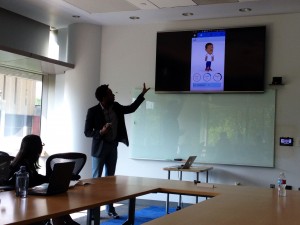Dr. Karl A. Morris, Assistant Professor of Computer Science at Temple University’s College of Science and Technology, demonstrates Samsung Self, an application developed by Philadelphia high school students in Temple’s Urban Apps & Maps Studio.
Two Philadelphia high school students temporarily put their summer plans on hold for a unique afternoon activity: The students, from Temple University’s Urban Apps & Maps Studios, delivered a technology prototype presentation to a leading executive from Samsung.
Sharing conference-room space with Young-jun Kim, Senior Vice President of Design of Samsung Electronics and President of Samsung’s Art and Design Institute, the students unveiled Samsung Self, a platform they developed to incentivize youth to have an active lifestyle and reduce the health risks associated with obesity. Using an avatar that reflects the user’s current condition and activity level, a user’s every movement is tracked, including staircase climbing, walking, watching movies in front of a TV and listening to music. Self connects various aspects of a busy youth’s life that can affect their health through digital rewards that could be applied to music downloads, for example.
The students’ mission was to create a digital platform that would appeal to fitness junkies and novice exercisers, alike.
“A student’s life is very well-structured, and doesn’t leave much time for activities like exercise,” said Dr. Youngjin Yoo, the Harry A. Cochran Professor of Management Information Systems and the founder of Temple’s Apps & Maps Studio. “Self was designed with the student in mind. It’s a fully synchronous application that would cater to their busy schedules in order to maintain healthy lifestyles.”
Samsung, a project sponsor, had supplied Urban Apps & Maps students with the company’s smart phones and existing fitness wearables, so that they might provide research findings and feedback from one of the world’s most-coveted marketing demographics – teenagers. What the students found, in a thorough five-tiered research methodology, was that while high-school-age students were prone to using wearables, these devices had the most impact “on people who didn’t need them,” said Sylvia Lin, a senior at Philadelphia’s Central High School.
The group’s research rendered startling statistics, as well. More than 61 percent of the students they polled do not consider portion size, and fewer than 42 percent packed their lunches each school day. According to the Center for Disease Control’s Youth Risk Behavior Survey, released in 2013, more than 14 million American high school students are classified as obese.
That’s how the student group arrived at Self. Lin and Jeff Cook, a senior at George Washington Carver High School for Engineering & Science, detailed its features, primarily SSENERGY, which issues points for users’ healthy eating and exercise habits. SSENERGY points act as a currency in the system, for online purchases or downloads.
“We propose that motivation for fitness and exercise can be achieved through unorthodox methods,” Lin said during the presentation. “Teenagers are already using their phones to complete so many functions. An interface like Self is one way technology can curb the trend of teenage obesity.”
“Samsung is a global company and our products are available everywhere,” Kim said. “However, our products and services must reflect local culture and context. Working with high school students through Temple University gives us great insights that we cannot buy even if we hire the top design agencies”.
Added Yoo: “We see our area’s high school students as cultural researchers who are experts in tomorrow’s high tech culture.”
Lin and Cook developed Samsung Self with the assistance of a half-dozen high-school-age peers, as well as student and professor mentors from Temple, including: Yoo; Dr. Karl Morris, Professor of Computer Science at the College of Science and Technology; Tyler School of Art graduate Bill Pierce; Fox School of Business MBA student Vivienne Dobbs; and more.
Urban Apps & Maps Studio is Temple’s university-wide, interdisciplinary program geared toward the encouragement, development, and founding of start-ups to transform urban challenges into products and services.
Apps & Maps, which receives funding from the John S. and James L. Knight Foundation, offers hundreds of high school students from Philadelphia access to a six-week program, through which they learn digital design and business skills from Temple student and professor mentors. From that larger group, a few are handpicked to remain as year-round fellows.

